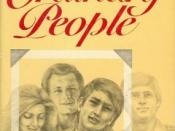Ordinary People I want to be able to say that I loved this book, but after having read it, I wasn't all that moved. Of the opinions I have gotten from my friends about this book, I don't think I have received a single negative one. I know it is considered some sort of literary masterpiece, and in my saying I wasn't too impressed, I hope to not come across like a teenager that is unable of "ÃÂfurther thinking' to reach a "ÃÂdeeper meaning'. I just couldn't feel much for these characters. Yes, I think the mom is selfish and has an inability to love, and yes, I feel badly for Conrad and Cal's situation. But as far as wanting to find out what would happen to them next, I was left with a lack of caring. Guest's style of writing and building these characters simply didn't draw me in.
Due to this book's non-exciting plot, which went relatively nowhere, I think this is the sort of story that you really need to care about what the characters are feeling and going through, in order to enjoy it.
In a sense I enjoyed how this novel was written. It made you enter the character's minds in a way that most books do not. That was a refreshing way to hear a story, as well as mildly confusing at times. Sometimes I just had to stop and ask myself, "Okay"æ WHOSE thoughts are we following now?"àFor the most part though, it was easy to follow"æ all but for a couple of exceptions. One being the over-abundance of characters, most of which were of little importance; over nineteen: Conrad, Calvin, Beth, Dr. Berger, Dr. Crawford, Lazenby, Stillman, Van Buren, Jeannine, Karen, Mr. Faughnan, Coach Salan, Ray Hanley, Suzanne Mosely, Howard, Ellen, Ward, Audrey, and last but not least Buck, who insisted on further confusing us by also being referred to as Jordan. Another part of Guest's style in this book which left me dizzy were the italicized dream sequences that were badly in need of a few commas. For example: (p.76) "He is perplexed vaguely angry what crumby workmanship how will he maneuver here he must crawl on his stomach scraping piles of sand toward himself he is too tired for this game would like to quit but still he keeps going wriggling past the first set of shorings before he rests again."àI saw the need for at least ten commas in that passage.
Throughout this novel I kept waiting for something to happen. For Conrad to come to terms with what has occurred, for him to die? Find real happiness? Run away? But I wasn't left with much"æ sure, a little fight with Stillman"æ Karen kills herself (but we didn't really care anyway did we? She was barely introduced), and Beth leaves - I suppose that was the climax.
There were a few aspects of this story that I did, however, feel passionate about. One was the way Conrad had tried to take his own life, a subject I have been exposed to in my own life, and his own mother's biggest concern appeared to be the blood she had to clean up off of her floor. That really angered and disgusted me. Her son was ready to end everything because he was so unhappy and all that woman could think about was herself, and her bathroom tiles. (p.237) "That whole vicious thing! He made it as vicious, as sickening as he could! The blood-all that blood! Oh, I will never forgive him for it! He wanted it to kill me, too!"ÃÂ Another part that interested me was when Jeannine and Conrad finally became close. I found it held my attention more than all the dull, tedious "ÃÂCal at the Office' crap combined. My favorite part of their romance in the book was when Conrad was at Jen's house and she fell apart after seeing her Mom's boyfriend. Con had always been the one who depended on others, such as the hospital and Berger, but then he realized that Jen depended on him. I think that was a big step for Conrad's mental well-being. It seemed Jeannine alone furthered Con's progress an equal amount as his visits to Berger. (p.251) "And he squeezes her tightly, feeling the sense of clam, of peace slowly gathering, spreading itself within him. He is in touch for good, with hope, with himself, no matter what."ÃÂ Romance touches me more than Cal's tipsy evening with Beth at the Murray's or his flashbacks to Bacon and the Evangelical home. It took some effort for me to read through many of the chapters concerning Cal. He seemed very oblivious to his family's problems, especially to his wife, who could do no wrong, particularly due to her still-perfect legs and slender waist.
Even though I didn't particularly enjoy this book, I believe it had a message that could be beneficial to many kinds of people. As for the title, Ordinary People, I thought it was fitting in most ways. For any people to be ordinary, they must have some dysfunction and chaos in their lives. Those who do not "ÃÂ the perfect happy family unit "ÃÂ would indeed be very unordinary.





